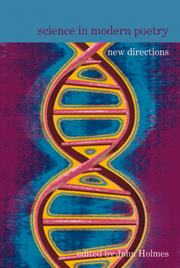Book contents
- Frontmatter
- Contents
- List of Contributors
- Acknowledgements
- Introduction
- Part I Science and Contemporary Poetry: Cross-Cultural Soundings
- Part II Science in Modernist Poetry: Appropriations and Interrogations
- Part III Darwinian Dialogues: Four Modern Poets
- 9 ‘Accidental Variations’: Darwinian Traces in Yeats's Poetry
- 10 Making the Past Wake: Anthropological Survivals in Hardy's Poetry
- 11 Reading Bishop Reading Darwin
- 12 From Bergson to Darwin: Evolutionary Biology in the Poetry of Judith Wright
- Afterword
- Bibliography
- Index
9 - ‘Accidental Variations’: Darwinian Traces in Yeats's Poetry
from Part III - Darwinian Dialogues: Four Modern Poets
- Frontmatter
- Contents
- List of Contributors
- Acknowledgements
- Introduction
- Part I Science and Contemporary Poetry: Cross-Cultural Soundings
- Part II Science in Modernist Poetry: Appropriations and Interrogations
- Part III Darwinian Dialogues: Four Modern Poets
- 9 ‘Accidental Variations’: Darwinian Traces in Yeats's Poetry
- 10 Making the Past Wake: Anthropological Survivals in Hardy's Poetry
- 11 Reading Bishop Reading Darwin
- 12 From Bergson to Darwin: Evolutionary Biology in the Poetry of Judith Wright
- Afterword
- Bibliography
- Index
Summary
We pieced our thoughts into philosophy,
And tried to bring the world under a rule
Who are but weasels fighting in a hole.
(‘Nineteen Hundred and Nineteen’)There is surely no major poet less amenable to Darwinism than W. B. Yeats. His poetic philosophy is resolutely opposed to the scientific thinking and the arid materialism that he sees stifling modern thought. All students of Yeats quickly learn that the poet set his teeth against the ‘grey truth’ of science, targeted in the first of his Collected Poems, ‘The Song of the Happy Shepherd’ (l. 4). Across his career, one finds him railing against material ism and its associated artistic forms of realism and naturalism. The ancient, visionary Ireland that Yeats valorises opposes ‘this filthy modern tide’, providing a spiritual and idealistic bulwark against a debased epistemology of surfaces (‘The Statues’, l. 29). Like his favoured Romantics, who saw the empiricism of eighteenth-century philosophy as the enemy of the creative imagination, Yeats opposed the scientism of his day.
There are many other ways in which Darwinism is antipathetic to the Yeatsian project. Yeats's approach to history, apocalyptic and cyclical, opposes the gradual, protracted, incremental change over vast swathes of time on which Darwin based his theory. Historical change in his poetry usually happens with a sudden blow, an incarnatory or transfixing moment, after which all is changed, changed utterly.
- Type
- Chapter
- Information
- Science in Modern PoetryNew Directions, pp. 151 - 166Publisher: Liverpool University PressPrint publication year: 2012
- 2
- Cited by



